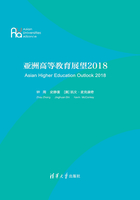
Chapter 5 Identifying Alignment in Asian Higher Education with the Needs of Government and Society
The roles of AUA members include developing and disseminating knowledge, improving international relations, and supporting the broader call for sustainable development. Given the variety of social, economic, and cultural factors within and among Asian countries, much is to gain from the diverse higher education response in terms of human resource development, government restructuring initiatives, and developing innovation and creativity to drive innovation-based development. AUA can pave the way for greater resource mobilization amongst members to support respective institutional missions as relevant to their national development goals, and pursuing cooperation and greater region building in the broader Asian context.
Asian universities contribute to the region's social and national development through an increasing focus on the economic and social impact through maintaining a balance across basic research, applied research, and user-inspired research. The universities also transmit knowledge generated through teaching and research to the broader community, through a range of public service, engagement, and outreach activities as well as through an increasing partnership of universities and their expanding alumni.
Asian universities contribute to the region's cultural advancement in many ways, including: providing the curriculum to promote local, national and regional cultures and languages; raising the students' awareness and capacity to appreciate and create, developing and maintaining cultural infrastructure such as art academies, museums, theatres, concert halls, science exhibitions, and art galleries. Universities serve as a strong foundation of nation-building through hosting repository for national sentiments, exerting actual and symbolic influence such as reinforcing national values, providing opportunities to celebrate national traditions, and embrace multicultural and or multi-ethnic societies.
Asian universities contribute to the region's international engagement primarily through fostering global awareness, multi-cultural understanding and communication among students, faculty and staff. In addition, they create international partnerships with overseas universities and organizations that lead to greater academic and cultural exchange.
An increasing number of universities in Asia have articulated in their mission a growing commitment to international and global engagement. Meanwhile many governments in Asia have adopted internationalization strategies, including worldclass university strategies, to redefine the functions and roles of their public universities. At both institutional, national and regional level, higher education internationalization strategies serve to increase access, enhance quality, attract and retain talent, expand the knowledge and skills of the labor force, as well as stimulate domestic education sector to become more competitive globally.